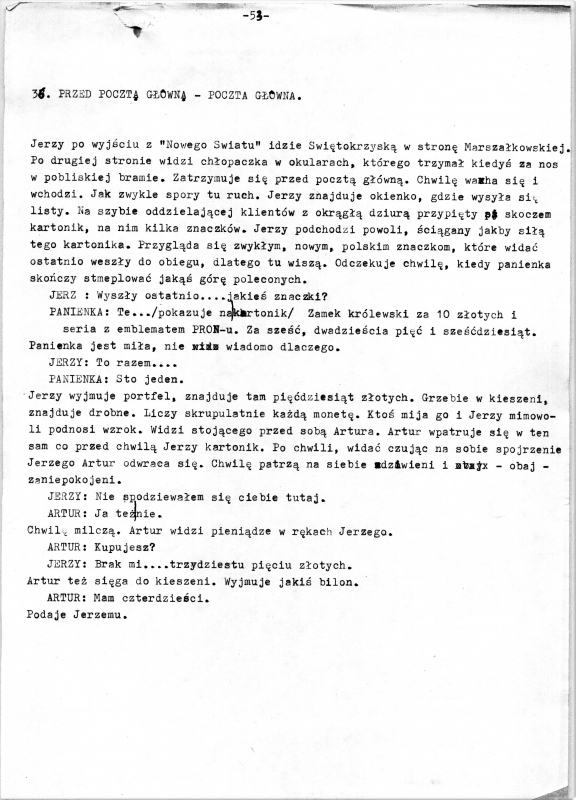Main Post Office
Designed by Józef Handzelewicz, this early modernist building was constructed in 1922–23. After its destruction during World War II, it was rebuilt in 1961, one floor shorter than before, to serve as the main office of the Polish Post.
Decalogue Ten
At the post office, Jerzy buy stamps from a counter clerk (Tomek, the main character in Decalogue Six, played by Olaf Lubaszenko). As it turns out, despite all the trouble the brothers went through after inheriting the stamp collection left by “Korzeń” (their late father’s nom de guerre), they still have a deep passion for philately. Stamp collecting was one of the most popular hobbies in late-twentieth-century Poland. Collectors clubs like the one frequented by the characters’ father cropped up all over the country. One of them was featured in the short documentary In the Club (1963) by Kazimierz Karabasz, Kieślowski’s film school professor, while Tadeusz Pałka, of the Documentary Film Studio in Warsaw, where all three of them worked, produced a short documentary in 1975 titled The Collector, about an award-winning philatelist who amassed his collection at the cost of subjecting his wife and sons to serious hardship. Even now, in the twenty-first century, stamps continue to provoke a strong desire for ownership. Twenty years after the episode was shot, a historic set of stamps priced at several million złoty was stolen from the Post and Telecommunications Museum in Wrocław. The brazen thieves replaced the pilfered items with high-quality counterfeits. When Quentin Tarantino was called up to accept the Academy Award for Best Original Screenplay at the 1995 Oscar ceremony, he leaned over to Krzysztof Piesiewicz (who, with Kieślowski, was co-nominated for the screenplay to Three Colours: Red) and said: “I learned how to write screenplays by watching Decalogue Ten.”
The signs visible in the two large windows in this scene in central Warsaw (Filatelistyka, meaning philately) are a sign of the importance and popularity of stamp collecting in late-twentieth-century Poland. Sitting inside a parked car, Jerzy’s son (Maciej Stuhr) points to a young man who tricked him into selling a rare stamp from his late grandfather’s collection. Jerzy (Jerzy Stuhr), hitherto a level-headed and respectable paterfamilias, is also willing to stoop to subterfuge to recover the precious scrap of paper: he lures the teenager into an alley and gives him a bloody nose. This scene echoes a similar event in Decalogue Five, in which Jacek (Mirosław Baka) witnesses men ruthlessly beating their victim in a side street (in the same part of town), and perhaps reaches the conclusion that the evil ravaging the city is an immanent part of the world around him. In the first scene of the final episode in The Decalogue, Jurek’s brother Artur (Zbigniew Zamachowski) sings a song titled “Kill, Kill!”, whose lyrics form an anti-Decalogue of sorts. The words were penned by Krzysztof Kieślowski, while the band performing with Artur is the famous 1980s Polish rock group Róże Europy.
